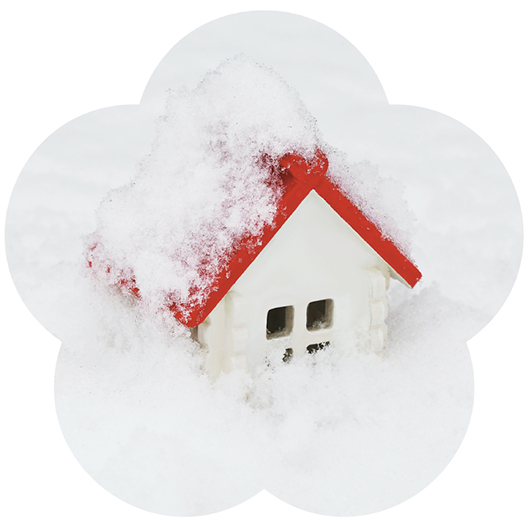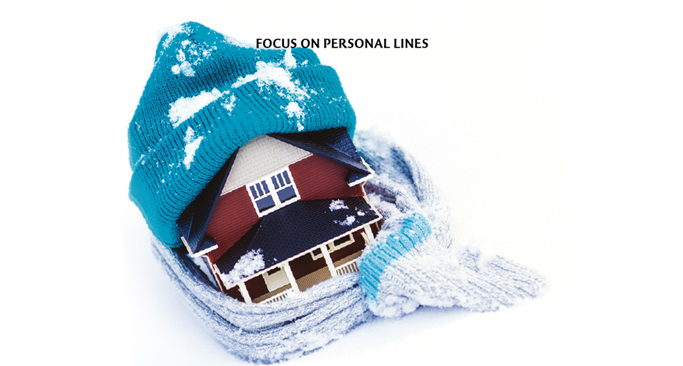A seasonal guide for insurance agents
By Christopher Reid
As trusted advisors, insurance agents play a critical role in helping clients protect their homes from seasonal risks. Since 2020, purchases of secondary and vacation properties have surged in many high-end communities. These homes, often located in coastal or remote areas, can be vulnerable to dramatic swings in temperature and other perils in the off-season months.
Over the last 20 years extreme winter weather losses have averaged $1.2 billion annually. In addition, inflationary increases in the high net-worth property market make it necessary to review and confirm that proper coverage is in place in the event of a claim.
With the fall season upon us, now is the time to proactively educate policyholders on winterizing their properties. While agents are well versed in policy forms, coverage and potential exclusionary language and pitfalls, simple checklists may assist in avoiding claims from happening altogether.
Following are actionable tips agents can share with clients to help prevent common winter-related claims, reduce property damage, and reinforce the value of proper coverage. Use this resource to support seasonal outreach, deepen client relationships, and position yourself as a knowledgeable partner in risk prevention.
Roof
A thorough inspection of a home’s attic, skylights and roof can identify any damage that occurred during the warm weather months that may cause issues when ice and snow start to form. A roof in good condition should be able to withstand 20 pounds of snow/ice per square foot. If a roof is damaged and is not fixed, the homeowner puts their property at risk of a roof collapse, which is not only costly, but can be very dangerous for the inhabitants of their home.
Because roof inspections can be hazardous, most homeowners should hire a professional to do this job. If a client chooses to do it themself, they should wear well-fastened shoes with non-skid soles, and make sure another person is close by in case they suffer a slip or fall.
Review the homeowners policy for coverage details on roof replacement in the event of a claim; in recent years there have been changes in claim payment schedules based upon the original roof year and replacement cost versus actual cash value.
Pipes
Frozen pipes can lead to pipes bursting, causing thousands of dollars in damage to the home. Some pipes are at a higher risk for freezing during winter months, such as those on the exterior of the home, pipes located in exterior walls, or exposed pipes in unheated areas of the home.
To help avoid the freezing of outdoor pipes, it’s important to disconnect any water hoses from outside, drain them, and store them for the winter season. Then close the interior shut-off valve for that faucet, open and drain the pipes and install a faucet insulator, which can be purchased at most home improvement stores.
Pipes that are in an attic, crawlspace or garage should be insulated with foam insulation or by wrapping them with heat tape. Wrapping pipes near the exterior walls can also help avoid freezing.
Check policy endorsements for water damage deductibles, sub-limits and minimum temperatures required for coverage on season homes. Partner with vendors like Beagle Services (beagleservices.com) for a suite of water damage prevention services.
Those who choose to add a prevention system should check with their carrier for premium credits that might be available!
Heating systems
It’s a good idea to test the heating system to make sure it is in working condition—before the homeowner needs the heat! They should make sure all heating vents are unobstructed to allow for maximum air flow. Recommend they hire an HVAC professional to clean heating ducts (once every year or two) and to inspect the heating system or furnace once yearly.
Signs that an inspection should be performed sooner include unusual noises (“screeches” or “whines”) that may indicate worn or damaged belts, poor performance and erratic behavior. If furnace filters are dirty, the unit will need to work harder to heat the home, using more energy.
Furnace filters should be changed once monthly during the winter.
Gas heaters
Properly maintaining a gas heater is both a cost efficiency and safety issue. If the gas heater is not properly maintained, it can cause dangerous poison to enter the air of the home and, at the very least, it may be costing more money to run than it should. Carbon monoxide detectors are essential for any owned property.
A professional should check the gas heater once a year, but there are some maintenance things homeowners can and should address on their own. First, they should shut off the heater. Have them check the air-shutter openings and exhaust vents for dirt and dust, then vacuum the air passages to the burner. It’s also important to clean the burner of lint and dirt.
Make sure they check the owner’s manual and follow directions for any other needed maintenance.
Yard and outdoor maintenance
Trees and shrubbery should be trimmed of excess limbs. The weight of snow and ice can cause limbs to break and damage a client’s property or the property of their neighbors. Other steps homeowners should take:
- Rake any debris away from the foundation of the home.
- To protect a deck from weather damage, apply a fresh coat of high-quality wood sealer before winter.
- Drain any water fountains and unplug the pumps.
- Inspect sidewalks, driveways and steps for damage, and repair them before the addition of ice, which can be responsible for dangerous falls during the winter.
- Check any handrails to make sure they are secure, to help prevent falls.

A thorough inspection of a home’s attic, skylights and roof can identify any damage that occurred during the warm weather months that may cause issues when ice and snow start to form.
Pool
Homeowners should make sure to clean out leaves, debris and insects from the pool, skimmer and pump basket. They should follow the manufacturer’s guidelines on additional cleaning steps or addition of winterizing chemicals.
To prevent damage from freezing, it’s recommended to drain pool to a level below the skimmer mouth but do not empty the pool completely. Homeowners should actually consider using a professional to open and close the pool each season.
Air conditioning unit
Have clients clean any debris and dirt from the fan blades and condensing coils by using a hose, with the spray head on highest pressure setting. Covering the condensing unit with a breathable, waterproof cover during winter months is an inexpensive way to avoid rusting or freezing of internal components and may extend the life and efficiency of the unit.
During winter months, window units should be removed, if possible. If they can’t be removed, it’s important to make sure vents are closed and the units are covered with a breathable, waterproof cover.
Windows
Windows can be a major culprit in losing heat (and driving up electric bills) during the winter months. Have homeowners inspect all of their windows and consider replacing inefficient or very old windows with new, more energy-efficient windows.
The caulking material around windows should be replaced periodically to ensure that warm air is not escaping and that cold air is not entering the home.
Fireplace and chimney
It is recommended that fireplace chimneys be inspected yearly (even if they are not being used regularly) to look at all heating venting systems, chimneys, stove systems and furnace flues. During these inspections, defects or issues may be found that require action, even if cleaning is not needed.
Professional cleaning is recommended every couple of years, depending on how often the chimney is used. Chimneys should be professionally cleaned early in the season.
Gutters
Cleaning out gutters is a simple step that ensures water can continue to flow, preventing icicles and ice dams from forming in them and causing damage. Gutters should be cleaned out in the fall and then again before winter temperatures start in the area.
This can be a dangerous job for some homeowners, so hiring help may be essential.
Water heater
Lowering the temperature on the home’s water heater from 140 degrees to 120 degrees may save the homeowner money and should have little effect on their access to hot water. Additionally, a water heater cover is an inexpensive purchase that helps prevent heat loss, which may help reduce the utility bill.
Lawn irrigation
Sprinkler systems should be winterized early in the season, before the first freeze. This will include turning off the water supply and blowing compressed air through the lines, ridding them of water to prevent them from freezing and bursting.
To freeze-proof an in-ground irrigation system, clients should follow the manufacturer’s procedure for draining it and protecting it from winter damage.
Conducting an energy audit
Many utility companies will perform a free energy audit in the home to help clients identify areas that may be driving up their energy costs.
In conclusion, winter weather can be unpredictable—and costly. By proactively sharing these winterizing tips, you as an insurance or risk advisor can help clients reduce the risk of property damage, avoid common claims, and stay safe during the colder months.
Use this information as an annual touchpoint—or series of touchpoints—to reinforce your role as a trusted advisor, to encourage policy reviews, and to highlight coverage options that protect against winter-related losses.
Whether through email outreach, social media, or one-on-one conversations, this content can empower you to build stronger relationships and demonstrate real value beyond the policy.
The author
Christopher Reid is vice president of sales-personal lines at Jencap in Red Bank, New Jersey. Reid is a 35-year sales executive with industry experience in financial services, insurance and technology. Reid has been with Jencap for more than a decade, focused on helping high net worth agents with creative solutions for their clients’ personal lines needs. For more information, email christopher.reid@jencapgroup.com or visit jencapgroup.com.







